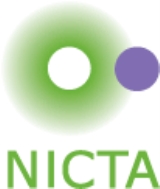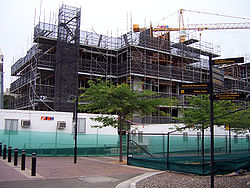
National ICT Australia
Encyclopedia

Research
Research can be defined as the scientific search for knowledge, or as any systematic investigation, to establish novel facts, solve new or existing problems, prove new ideas, or develop new theories, usually using a scientific method...
excellence and, through application of this research, to create national benefit and wealth for Australia. NICTA aims to be one of the world's top ten ICT research centres by 2020.
NICTA's research is structured around Research Groups, and Business Teams (see below).
Research Groups and Business Teams
NICTA research is focused in six large scale Research Groups.- Software Systems
- Networks
- Machine Learning
- Computer Vision
- Control and Signal Processing
- Optimisation
These groups each have a long-term vision for innovative ICT research with the aim of becoming the leading groups in their fields.
NICTA focuses on wealth creation opportunities that draw on and exploit its area of research excellence. This takes the form of funded industry partnerships, spin-out companies or research outcomes which have a major societal impact. Four Business Teams drive commercial outcomes in the following recognised application domains for ICT:
- Broadband and the Digital Economy
- HealthHealthHealth is the level of functional or metabolic efficiency of a living being. In humans, it is the general condition of a person's mind, body and spirit, usually meaning to be free from illness, injury or pain...
- Infrastructure, Transport and Logistics
- Safety and Security
NICTA is especially focused on developing outcomes that have major national benefit.
Locations
NICTA has over 700 people spread across five cities:- Australian Technology Park Laboratory and Headquarters, Sydney
- Neville Roach Research Laboratory, Kensington, Sydney
- Canberra Research Laboratory
- Queensland Research Laboratory
- Victoria Research Laboratory
- Outreach programs in South Australia
Funding
NICTA is funded by the Australian Government as represented by the Department of Broadband, Communications and the Digital Economy and the Australian Research CouncilAustralian Research Council
The Australian Research Council is the Australian Government’s main agency for allocating research funding to academics and researchers in Australian universities. Its mission is to advance Australia’s capacity to undertake research that brings economic, social and cultural benefit to the...
. NICTA is also supported by its members and partners.
History
In 2002, NICTA won a competitive selection process to be established as Australia's national centre of excellence in Information and Communication Technology (ICT) research, under an Australian Government policy initiative to promote science and innovation called Backing Australia's AbilityBacking Australia's Ability
Backing Australia's Ability was a five year innovation plan launched in January 2001 by Prime Minister John Howard.- Previous policy :* Investing for Growth, December 1997 increased support for business innovation by providing $1.26 billion over the four years from 1998-99, including additional...
. The creation of the centre was intended to address a previously identified weakness in long-term strategic ICT research in Australia. NICTA was officially opened on 27 February 2003.
The founding members of NICTA were the University of New South Wales
University of New South Wales
The University of New South Wales , is a research-focused university based in Kensington, a suburb in Sydney, New South Wales, Australia...
, Australian National University
Australian National University
The Australian National University is a teaching and research university located in the Australian capital, Canberra.As of 2009, the ANU employs 3,945 administrative staff who teach approximately 10,000 undergraduates, and 7,500 postgraduate students...
, the NSW Government
Government of New South Wales
The form of the Government of New South Wales is prescribed in its Constitution, which dates from 1856, although it has been amended many times since then...
, and the ACT Government
Australian Capital Territory Legislative Assembly
The Australian Capital Territory Legislative Assembly is the unicameral legislature of the Australian Capital Territory...
. NICTA later acquired other university and government partners. In January 2003, The University of Sydney became a partner. In July 2004, the Victorian Government
Government of Victoria
The Government of Victoria, under the Constitution of Australia, ceded certain legislative and judicial powers to the Commonwealth, but retained complete independence in all other areas...
and The University of Melbourne became partners. In January 2005, the Queensland Government
Government of Queensland
The Government of Queensland is commonly known as the "Queensland Government".The form of the Government of Queensland is prescribed in its Constitution, which dates from 1859, although it has been amended many times since then...
, the University of Queensland
University of Queensland
The University of Queensland, also known as UQ, is a public university located in state of Queensland, Australia. Founded in 1909, it is the oldest and largest university in Queensland and the fifth oldest in the nation...
, Griffith University
Griffith University
Griffith University is a public, coeducational, research university located in the southeastern region of the Australian state of Queensland. The university has five satellite campuses located in the Gold Coast, Logan City and in the Brisbane suburbs of Mount Gravatt, Nathan and South Bank. Current...
, and the Queensland University of Technology
Queensland University of Technology
Queensland University of Technology is an Australian university with an applied emphasis in courses and research. Based in Brisbane, it has 40,000 students, including 6,000 international students, over 4,000 staff members, and an annual budget of more than A$750 million.QUT is marketed as "A...
became partners.
Since foundation NICTA has created six new companies, collaborated on joint projects with a range of ICT industries, developed a substantial technology and intellectual property portfolio and continues to supply new talent to the ICT industry through a NICTA-supported PhD program.

